Two words have taken the world by storm within the last couple of years: Artificial Intelligence. With ChatGPT gaining traction in 2022, people started to wonder about the endless possibilities of Artificial Intelligence. Some were hugely excited about all the new “cool” technologies that would emerge. Others started to worry about a potential lay-off at work and being replaced by a robot or software program. Frankly, the whole concept is quite disconcerting for everyone around the world. But how about we look at Artificial Intelligence from a different angle? Artificial Intelligence and education: how do these two worlds meet? This article discusses artificial intelligence in e-learning and how everything started.
Table of Contents
Overview of Artificial Intelligence
Let’s start at the beginning. What is even the definition of artificial intelligence? When we think of artificial intelligence, we often imagine a world of robots prepared to eliminate the human race with their exceptional intelligence. But let’s pop this thought bubble and return to the real world for a moment.
John McCarthy, one of the founders and computer scientists of Artificial Intelligence, developed the term in 1956; some even consider him the father of this discipline. He initially defined AI as “the science and engineering of making intelligent machines, especially intelligent computer programs” where “intelligence is the computational part of the ability to achieve goals in the world”.
Since then, Artificial Intelligence has greatly progressed and developed since McCarthy’s studies. Nowadays, various technologies and programs can surpass human intelligence, especially in speech, vision, and translation skills.
How does Artificial Intelligence work?
The process itself is quite complicated; AI is a broad discipline that demands technical knowledge and mathematical and algorithmic calculations for proper implementation. If we were to summarize the traits that AI scientists work towards developing, we would list them as follows:
- Knowledge
- Reasoning
- Problem-solving
- Perception
- Learning
- Planning
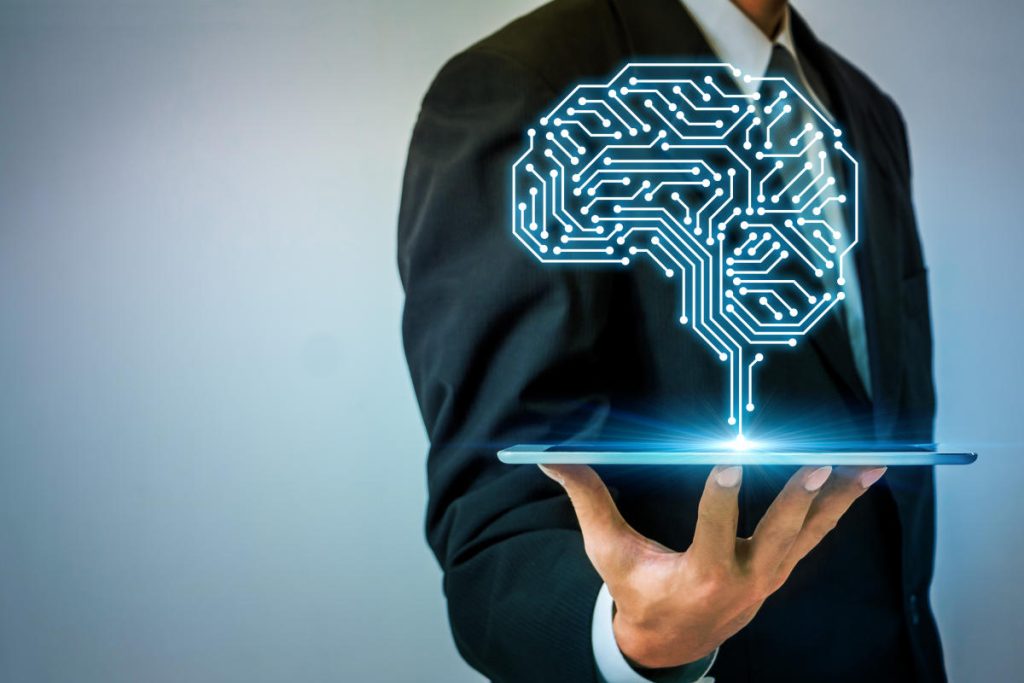
Artificial Intelligence examples
You might think that Artificial Intelligence is still far away from us now. In fact, it has been all around us in the last couple of years in various forms. You probably came across a GPS while driving to a new place. Instead of relying on printed maps, we have used GPS for many years now; it has tremendously helped drivers, cyclists, and pedestrians across the world. Using AI, the GPS works by storing the data of buildings, roads, and houses. Nowadays, any GPS can even identify traffic and congestion to recommend different routes to drivers.
Another example of AI is “biometric data” or face recognition that people use to unlock their phones. The phone can store your features and identify your face each time you try to unlock the phone.
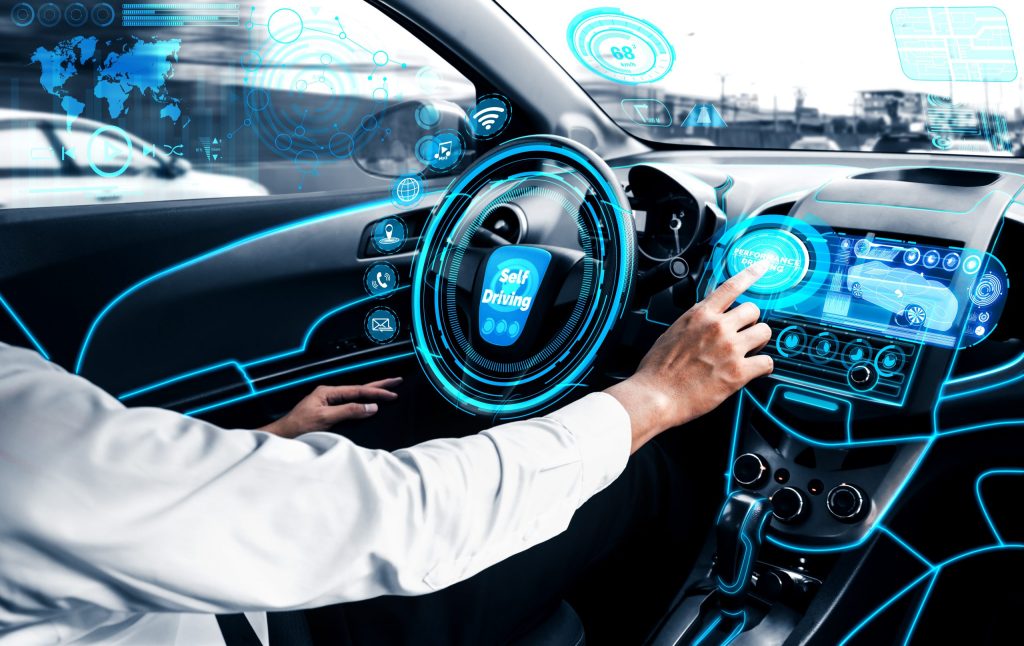
You must have used digital assistants before like Siri or Alexa. Digital assistants also work using AI; they can understand your question or command and perform tasks according to preset algorithms and stored data.
This might interest you: Modern Methods Of Teaching That Make An Awesome Classroom
Artificial Intelligence benefits
HolonIQ in 2019 predicted that “AI adoption in education will explode over the next five years and is expected to reach global expenditure of $6 billion by 2025. Much of the growth will come from China followed by the USA, together accounting for over half of global AI education spend.”
Take a look at how China uses artificial intelligence in e-learning:
Roles of Artificial Intelligence in distance learning
Humans, as everyone knows, are physically, energetically, and intellectually limited. Artificial Intelligence encourages humans’ innate intelligence to surpass its bounds to a certain level. Unlike what most people think, the purpose of Artificial Intelligence is not to completely replace us or take our jobs. In fact, the goal of developing AI programs is to actually extend and develop human potential.
World knowledge, in the past thirty to forty years, has been the result of the collaboration between people and machines. Nowadays, it’s common for humans and machines to work together to do a variety of activities. Machines, or computers, and the human brain both serve as instruments for processing information. While the human brain can make conclusions based on qualitative data, computers are capable of performing quick and accurate quantitative calculations.
As a consequence, the two work best together when integrated. In order to provide more individualized learning assistance and services, machines now have a greater ability to understand human emotion and behavior during the cognitive and learning processes. It is certainly impressive how Artificial Intelligence has the potential to not only match human wisdom in its greatness, but to also advance it by giving humans performance feedback.
Artificial Intelligence in e-learning
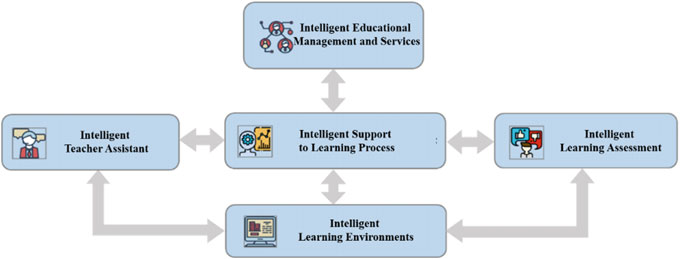
Take a look at the above figure; it presents five concepts regarding how Artificial Intelligence can enhance education. This figure is the culmination of Shengquan Yu’s studies in his book An Introduction to Artificial Intelligence in Education.
- Intelligent learning environments
- Intelligent support to the learning process
- Intelligent learning assessment
- Intelligent teacher assistant
- Intelligent educational management and services
In order to reach an understanding of how artificial intelligence in e-learning can help foster education, let’s see how Shengquan Yu discusses each concept in detail.
-
Intelligent learning environments
The cornerstone of intelligent education is the intelligent learning environment. The creation of smart campuses, campus security detection and early alarming, smart classrooms, unsupervised libraries, and AI-supported writing systems are just a few examples of how these technologies encourage the perceptual function of learning environments to meet a variety of needs and provide personalized services in an ever-present educational context.
-
Intelligent support to the learning process
The benefit that students receive from AI technology is known as intelligent support to the learning process. Artificial Intelligence can provide intelligent support for learning tools, the relevant learning material, and learner characteristics diagnosis.
The services that make up this system include “intelligent representation of knowledge and capacity structures; intelligent diagnosis and recommendation; cognitive load monitoring and early alarming; virtual inquiry learning environments; intelligent subject learning tools; intelligent tutoring learning based on brain science; intelligent robot partners and toys; and intelligent special education assistants.”
-
Intelligent learning assessment
The goal of intelligent learning assessment is to evaluate students’ mental and physical health as well as their knowledge development. “The diagnosis and assessment of students’ problem-solving skills, the monitoring and early alarming of students’ mental health, the monitoring and improvement of learners’ physical situation, the assessment of smart classrooms, and learners’ development planning” are some of the services offered.
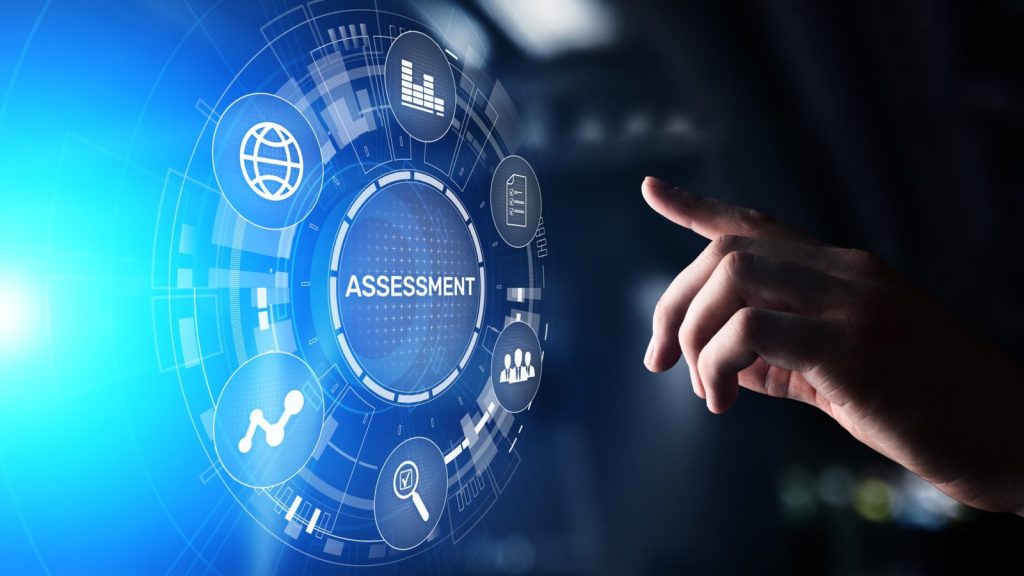
-
Intelligent teacher assistant
From the perspective of the instructor, an intelligent assistant reduces the workload of the teacher in the age of AI. Usually, the main services provided by the intelligent teacher assistant are “intelligent tutoring, intelligent support for question answering, intelligent support for question compilation for a quiz, automatic scoring, personalised support for students’ homework, personalised assessment report generation, teaching and research report generation, automatic instruction design generation, teaching summary generation for each semester and school year, and AI-facilitated good teaching support.”
-
Intelligent educational management and services
Intelligent educational management and services are essentially observed in how we might employ AI technologies to “promote educational equity based on massive educational data collection and analysis” to give intelligent management resources to school administrators. Artificial Intelligence technologies can also provide intelligent decision-making, advice to increase regional educational quality, dynamic monitoring of educational quality, personalized educational services, and “intelligent health service assistants”.
Now you can check Skolera’s features by booking a free demo with one of our experts. For more information on the benefits of Skolera’s LMS, check the infographic at the end of this article. ⬇️
Future of AI in education
We discussed the various roles and benefits of Artificial Intelligence in e-learning. Now, why don’t we delve deeper into the future of AI in education?
Impact of Artificial Intelligence on E-learning
According to Global Market Insights, “AI in Education Market size valued at USD 4 billion in 2022 and is anticipated to witness over 10% CAGR from 2023 to 2032, owing to the growing inclination towards personalized learning.”
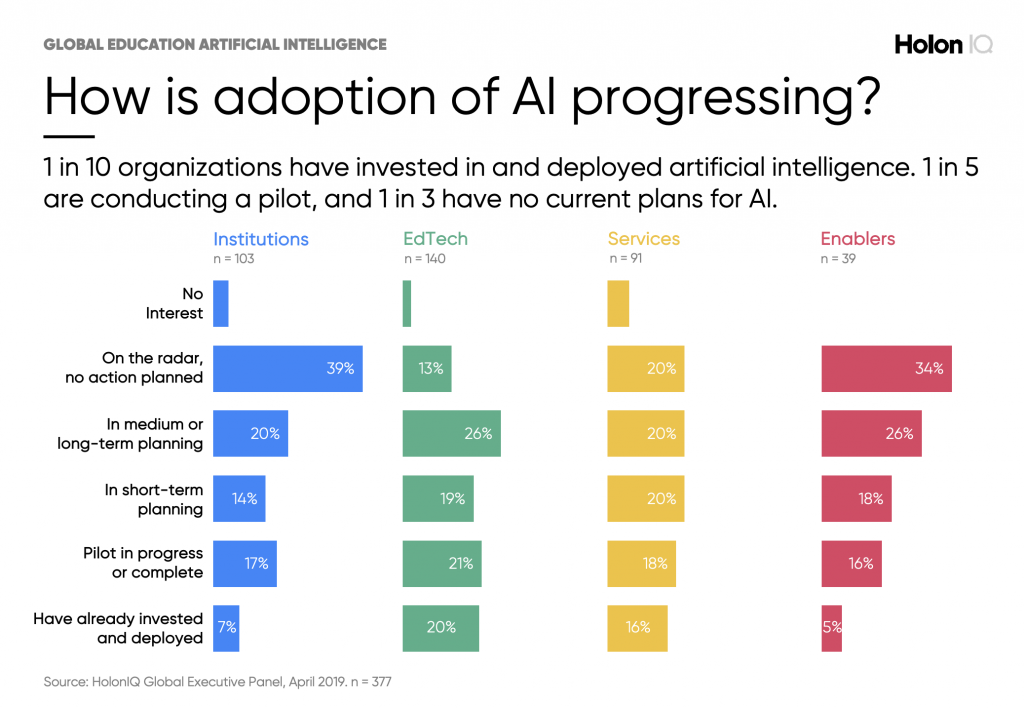
Artificial Intelligence in e-learning has started to take different shapes in the last couple of years. Educators and AI experts are working on providing the best experience for teachers and students alike through AI integration. Here are some of the facets of Artificial Intelligence in e-learning.
-
Favors the implementation of personalized learning
People learn at their own pace, and so do children. That’s why customizing learning for students is a great way to keep them on track. This educational approach aims to tailor learning to each student’s aptitude, demands, and interests. Using technology to enhance personalized learning is expected to take massive shape in schools and universities in 2023.
For instance, in the United States, some Artificial Intelligence in e-learning programs like New Classrooms can tailor learning and instruction with a heavy reliance on student data. These programs regularly evaluate students’ ability levels in order to tailor material delivery and assign students to different instructional modes. Their goal is to give training that is responsive to students’ skills and capabilities. They include teaching guided by teachers, student group projects, and instructional tools like “virtual adaptive tutoring”.
A strategy that has also gained momentum in the discourse about personalized learning is “Teach to One”. This technique uses data from ongoing formative assessments to pinpoint individual learning gaps. It is popularly used in mathematics to measure the development of abilities, such as the understanding of ratios and rational number connections.
In a typical “Teach to One” classroom”, students have daily access to dashboards that show their progress. They are also given assignments to fill in their skills gaps and are provided with links to various educational resources. The essence of this teaching technique is that students are free to progress at their own speed and create their own “playlists” of assignments and skills.
-
Fosters and supports special needs education
Artificial intelligence and technology have certainly had a huge impact on people’s lives, and they have shaped the educational landscape to make it more inclusive and accessible for students with different disabilities. In addition to influencing special needs students themselves, the implementation of AI has also influenced educational institutions’ efforts to develop inclusive pedagogies and systems.
One of the best things about Artificial Intelligence in e-learning is that it is usually connected with various stimuli. Accordingly, students with special needs can engage more with AI; all teachers know that class engagement equals success!
Introducing Artificial Intelligence into the class with special needs students means giving them a “hands-on” experience. This will drive them to experience real-time examples through different simulations. Teachers will definitely notice an increase in students’ understanding of the material.
AI systems have previously demonstrated their efficacy in assisting students with disabilities within the classroom. For instance, wearables powered by AI can assist visually challenged children in learning to read books, identify faces, and interact with others.
Augmented and virtual reality (AR/VR), and other AI-powered technologies also help the learning and engagement of special needs students. For instance, autistic students greatly benefit from AI as they can develop their social skills by engaging with virtual characters and digital objects in class.

-
Simplifies the delegation of mundane tasks to AI
By using Artificial Intelligence in e-learning software, you will be saving yourself the energy and time that are wasted on planning tests and correcting them. LMS platforms are usually AI-powered; they can automatically create tests, grade them, and create reports for each student to be sent to the parent and saved among the student’s files. It is no longer the case that teachers take care of these administrative tasks that eat up their precious time.
-
Cultivates an atmosphere driven by virtual reality and gamification
Augmented reality and virtual reality have recently become hugely attractive notions for educators and education technology experts. There is no doubt that student retention and comprehension are amplified when the student is exposed to interactive and immersive content. In 2023, academic institutions should certainly consider investing in this treasure of technology.
VR in teaching has a variety of special advantages. Incorporating virtual reality into today’s education gives teachers a new approach to connect with more learners. The purpose of VR is to improve, inspire, and stimulate students’ understanding of certain concepts while also enabling them to engage in practical learning.
But what makes VR in the field of education more enticing is that it can be used to imitate situations and let students perform operations without any danger. This can be seen in software programs that offer real-lab simulations like PraxiLabs. This may be used to conduct studies that have proven challenging to do in conventional educational settings. It can also teach students about safety protocols, and provide medical education without endangering the safety of actual patients in medical schools.
Read more: 15 Free Educational Apps for Students
Artificial Intelligence in e-learning systems
Edgeucating, a platform dedicated to supporting educators in creating inclusive, cutting-EDGE classrooms, forecasts that over 47% of tools used in LMS platforms will be driven by AI in the next three years.
When it comes to Artificial Intelligence in e-learning systems, the combination is quite rewarding for schools. AI is utilized in Learning Management Systems to produce feedback at the school or university. This makes LMS a great fit for improving primary and secondary education completion rates.
AI-based learning management systems can also transform standardized assessments, allowing for the expansion of the range of skills that can be evaluated. They can improve the assessments’ relevance to the skills that will become more crucial in a world dominated by digital technologies.
Related article: 7 Things To Know To Apply A Standards-Based Grading Scale
A crucial component of many educational systems is standardized tests; they greatly influence how students are taught and how they learn. Educators have become increasingly aware of assessments; they think that assessments should include complex skills such as collaboration, social and emotional intelligence, and problem-solving. They firmly believe that these skills are the foundation for the transformation of economies and societies in the world we live in today.
In this article, we discussed artificial intelligence in e-learning, and applications of artificial intelligence in e-learning nowadays. We also attempted to look at questions like, what is the future of AI in e-learning? How can schools benefit from AI-based learning platforms? We’re glad to say that we’ve managed to provide a comprehensive overview of Artificial Intelligence and how schools and teachers can gradually use it as a background to their work in schools. The implementation of AI in schools will take time, effort, and lots of research; so starting sooner rather than later is surely the best practice.
If you enjoyed reading this article, there’s plenty more! You can even receive our latest resources via email. Sign up for our newsletter and become a part of Skolera’s community now.
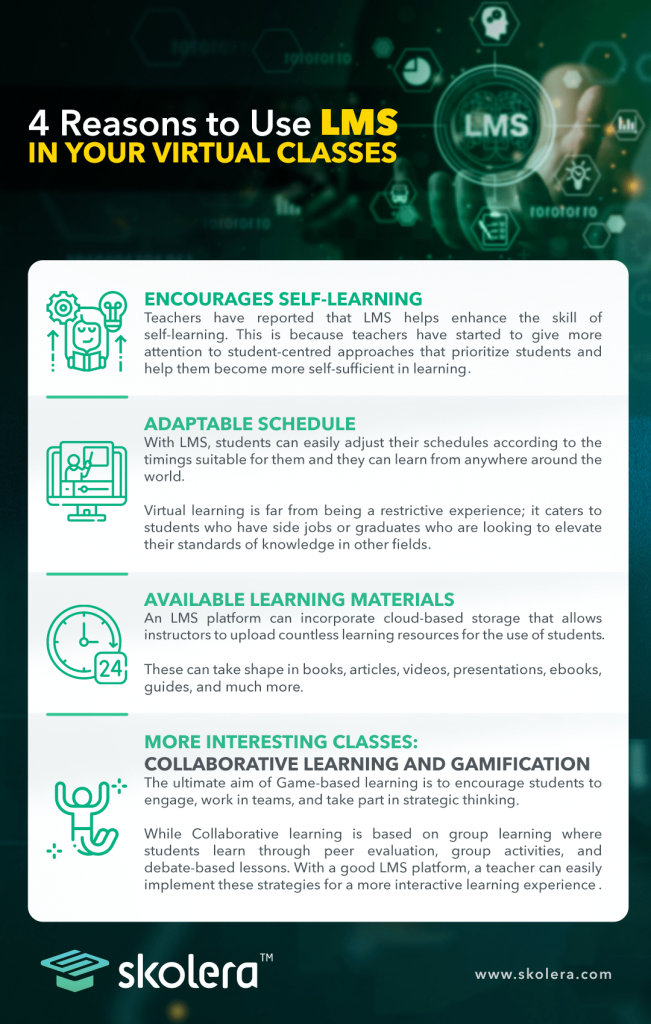
Sources:
Augmented Education in the Global Age: Artificial Intelligence and the Future of Learning and Work
 Skolera LMS Blog Educational Technology Articles and News
Skolera LMS Blog Educational Technology Articles and News




